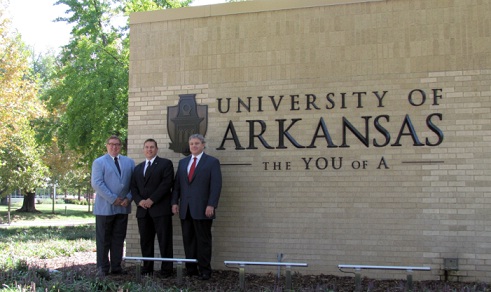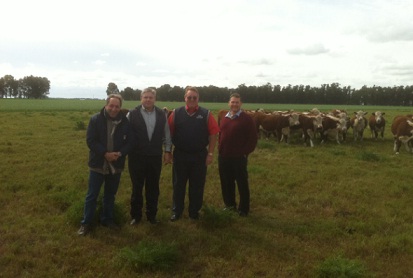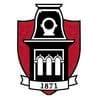Animal production experts from the University of Arkansas visit Argentina
Published: October 29, 2012
By: Engormix.com
Dr. Michael Vayda, Dean of Bumpers College of Agricultural Food and Life Sciences, Dr. Michael Looper, Head of the Department of Animal Science and Dr. Charlie Rosenkrans, Jr., Professor of the Department of Animal Science from the University of Arkansas visited Argentina invited by Dr. Hugo Arelovich from the National University of the South (UNS), Bahia Blanca, Argentina.
Dr. Looper tells us about their visit to Argentina, about UARK-UNS potential collaboration and about the presentations given at different organizations and companies.
You came to Argentina last year to give a talk about reproduction at the 1st Joint meeting AAPA and ASAS which was really successful. What´ s the purpose of your visit to Argentina this time?
Yes, when I visited Argentina last year for the Joint meeting I realized there were great opportunities for interaction with scientists, researchers and educators in Argentina with agricultural faculty at the University of Arkansas (UA). I visited with Dr. Hugo Arelovich from National University of the South (UNS) in Bahia Blanca at the Joint meeting. Our thoughts were to establish an agreement for student exchanges between our Universities. So the purpose of this trip is to visit the UNS and meet with faculty members and administrators to explore potential opportunities for our students. Accompanying me on this trip is the Dean of our Bumpers College of Agricultural Food and Life Sciences, Dr. Michael Vayda and Department of Animal Science professor, Dr. Charles Rosenkrans, Jr.

From left to right: Dr. Charlie Rosenkrans, Jr., Dr. Michael Vayda and Dr. Michael Looper
Why has the University of Arkansas chosen the National University of the South (UNS) in Bahia Blanca, Buenos Aires to start this kind of institutional exchange?
The Department of Agronomy at National University of the South has similar programs we offer to our students in Arkansas. In Arkansas, we focus on forage-based beef production. Argentina has been producing high quality beef on forages for hundreds of years. What better place for our students to learn about this type of production system than in Argentina? Argentina is a special place that will help our students experience a global perspective of beef production.
How would this student exchange program work?
We are still in the initial stages of setting up this agreement. We have invited faculty and administrators from UNS to Arkansas to visit us and tour the UA and other associated research and allied industry partners. Initially, undergraduate students from Arkansas would study at UNS, and UNS students would study in Arkansas. In my opinion, this should lead to agreements in the future for students to pursue Master of Science and/ or Ph.D. programs. After meeting with faculty at UNS, we were very impressed with the infrastructure that was in place for international studies.
You have also visited some organizations like INTA and the CONICET and companies like Cargill and Profertil… How was the experience there?
All of us were very impressed with our visits to INTA and CONICET. The facilities and laboratories were outstanding! More important, the people we met at each lab were more than accommodating and eager to work with us. We came away with a very positive outlook and look forward to fully establishing friendships as well as partnerships that best benefit all parties involved. We visited the Port and saw the vast facilities of Cargill and Profertil. We all agree there can be added value for our students to be involved with industry partners such as Cargill and Profertil to gain a better understanding of global markets.
You gave a talk for producers about the agricultural production in Arkansas. After your visit, what would be the differences and similarities among US and Argentinian production?
The producer talk was very insightful. Argentinian ranches are much larger than our typical farms/ranches in Arkansas. However, the more we talked about how things were done in Argentina and the US, we realized there are many similarities. Beef producers face similar challenges such as drought, rising feed costs, decreased market shares, etc. The bottom line is sustainability of the production system in both countries.

Would you tell us about the lecture you gave at the UNS?
All three of us (Looper, Vayda, and Rosenkrans) gave a series of talks during our visit. We spoke at UNS, two INTA locations (Barrow and Bordenave), and at the Camara Arbitral de Cereales, Oleaginosos, Frutos y Productos de Bahia Blanca. We provided an overview of agriculture production and economic impact of agriculture in Arkansas, an overview of the Bumpers College of Agricultural Food and Life Sciences, and the Department of Animal Science. With the producer talk, we provided examples of how funding was generated for internships and student exchanges in Arkansas. There was much interaction and follow up questions at each location.
What are the conclusions of this visit? Did it come up to expectations?
During this visit, I was able to see more of this beautiful country. The forage production is amazing. Overall, an excellent visit that was very informative and productive. Our group came away very excited about numerous opportunities to more fully explore. I think this collaborative effort between UNS and UA will provide valuable experiences for students at both Universities. The next step is for us to host UNS faculty members in Arkansas. We look forward to a beneficial relationship that adds value to our students’ experiences.
Source
Engormix.comMentioned in this news release:

Recommend
Comment
Share

Would you like to discuss another topic? Create a new post to engage with experts in the community.






